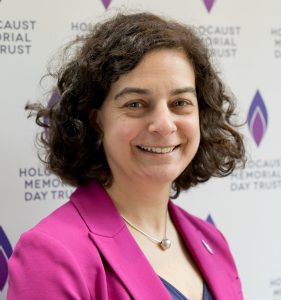HMDT Blog: Who does justice benefit?
Our Chief Executive, Olivia Marks-Woldman OBE, reflects on a UN Tribunal which tried two of the architects of the Genocide in Bosnia.

Image: Srebrenica, 2015, © Julian Buijzen Flickr.

Olivia Marks-Woldman OBE
On what may be an otherwise unremarkable day in February, we are marking the 20th anniversary of a UN tribunal convening at The Hague to try the architects and leaders of the systematic murder and persecution of Muslim civilians during the Bosnian war, including the genocide in Srebrenica. Mario Cerkez and Dario Kordic have the blood of thousands of people on their hands; Cerkez was the military leader, and Kordic was a Bosnian Croat politician.
For their parts in the civil war they served time in prison. But when we commemorate days such as this anniversary, we have to think long and hard about justice – what it means, and to whom, and how it impacts modern society. Ultimately, who does justice benefit? And does it help communities and nations rebuild after atrocities?
At the Holocaust Memorial Day Trust, we believe that justice is an important part of our work in remembering the lives lost during the Holocaust and subsequent genocides. It takes many forms, and in some cases it can be a long process, but justice is a stepping stone to groups and communities recovering from past experiences, as well as demonstrating that such crimes will not go on unpunished.
Sometimes the legal case swiftly follows the atrocities – as seen at Nuremberg – however, in most instances, legal reckoning is more protracted. Cerkez and Kordic were tried a few years after the Bosnian civil war ended, people responsible for the Holocaust have been tried in the courts ever since, and those responsible for death on a mass scale in Darfur remain at large.
This reality begs the question – if justice does not follow swiftly, does it make a difference? I firmly believe that it does. Irrespective of whether it has been a day, a month, a year, or ten, it makes a significant difference to the survivors – and sends a message to us all. For those responsible to be held to account, and forced to take ownership of the misery and suffering which they caused at the time and continue to cause, is absolutely critical to a community recovering from trauma on the scale of a genocide.
In holding responsible persons to account, the ideology that led to genocidal crimes is challenged. Which, in turn, goes a long way to help a nation or region stabilise after conflict, and rebuild toward a more peaceful, shared future. Ultimately, irrespective of historical wrongs and tragedies, groups and communities usually have to share and cohabit land and space, and unless justice is delivered the underlying politics or ideologies that led to genocide may be ever present in a society.
We must also ask ourselves: where do we start and end in putting people on trial? Are bystanders accountable for the wrongs of political or military leaders? Is doing nothing a crime? I believe not; however, it is part of the rebuilding process for these same people to understand the parts they played in what unravelled.
Whilst it would be unfair to put ordinary citizens on trial for being present and doing nothing – especially as they may have been in some degree of danger too – it is right that commemoration and education shine lights on how inaction and passivity in the face of oppressive ideologies can ultimately enable the persecution of a targeted group.
At the Holocaust Memorial Day Trust, we highlight the ten stages of genocide. The final stage is denial that genocide ever took place. The aftermath of genocide is a crucial period: to acknowledging the past honestly, rebuilding, honouring those who were murdered, living with huge absence – and to achieving justice.


